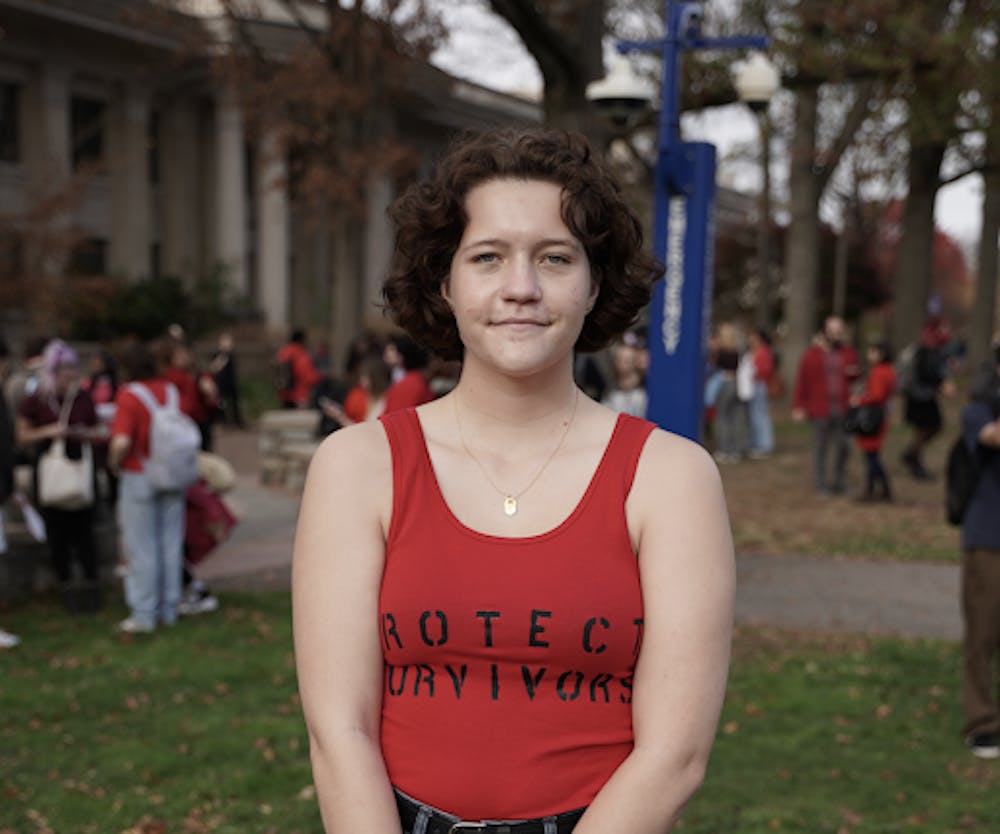Recently, my friend was updating me on a protest movement at Connecticut College, where she goes to school. To learn more, I turned to the best source: its student media organization, The College Voice. It’s the same thing I did when I was learning about the recent anti-sexual violence movement at Harvard University and the local anti-racist movement at Georgetown University. I texted The College Voice’s managing editor, praising her for its thorough and student-centered coverage. I understand covering these issues can be difficult and complicated, mostly because I’ve made American University’s student journalists’ lives difficult and complicated.
I led the student walkout against sexual violence and administrative inaction in November, I wrote the demands that over 1,400 community members signed and I’ve continued to drive student organizing against sexual violence on AU’s campus.
None of this was done alone; I had incredible co-organizers for the walkout, demands, subsequent events and our recent protest outside the Community Working Group meeting. There is another important piece of this: student journalism. Prior to the walkout, we sent a media advisory to multiple local reporters and stations. Very few responded, with the only national coverage being written by a former student reporter, Finley Muratova, for The Nation. Most of the coverage has been done by on-campus outlets like The Eagle, the American Agora, AWOL, The Rival and HerCampus.
Publications like The Eagle have spent more time than the administration focusing on sexual violence and meeting with organizers to understand the scope of the issue. I know this because I’ve spent more time speaking with student journalists, sometimes giving interviews, other times giving advice or offering context to complicated issues, than I have with administrators. They’re also significantly more dedicated to improving and learning. When my friend Faith Ferber was organizing at AU, she had a contentious relationship with The Eagle. She said she felt as though The Eagle let administration get away with the institutionalized victim blaming we still see today, with no critical examination of the University’s statements, leading to stories perpetuating or uplifting victim blaming and rape culture. Since then, The Eagle has put in a concerted effort to ensure all coverage of survivor issues is thoughtful and well-written. I’ve proudly introduced journalists to Ferber, never once thinking they’ll hurt her the way some did previously. The administration hasn’t changed at all, despite their assertions otherwise.
Student journalists who have covered protests or events I’ve hosted have been respectful of boundaries, the subject matter and our time. They understand the sometimes chaotic life of a student — the random 20-minute break between classes and the unique stress students face — because they are students. Administrators treat us like we’re either children or enemies of the state, simultaneously talking down to us while also accusing us of being vigilantes or tearing down and destroying the University community.
“Students know what students need” is something I’ve found myself repeating over and over in meetings with administration when I’m begging for them to just listen. In student journalism, students know how to represent students’ voices better than any outside organization. They’re able to connect with the subject matter more, have access to other students and generally understand the campus idiosyncrasies in ways that would be near impossible to explain to an outsider. It’s hard to make a Wonk Cat joke to a Washington Post reporter, but someone from The Eagle will understand exactly what I mean.
For another measure of how seriously student journalists are taking this, look no further than The Rival. The campus’ most famous satire outlet prides itself on making fun of the strangest parts of our community — of which there are plenty — but it has emphasized taking sexual violence seriously. It has vocally and outwardly supported our demands and protests, as their lack of affiliation with the University gives them free will to do as they please.
The Eagle has also endorsed the demands in a staff editorial and published other editorials that show the paper’s support for the movement and covered every protest or event we’ve had. As an organizer, I value the relationships I’ve built with student journalists. I’m able to give them a heads-up prior to events so they can plan their coverage, I make myself available for interviews and I make sure they’re prepared for what the event will look like.
This is not to say that The Eagle is perfect. There are recent times in which it has harmed marginalized communities, especially students of color, and I do not speak for those impacted. Nobody gets it right all the time, and The Eagle is no different. There's still room to grow, for all of us. I can only speak to my experience and how The Eagle has attempted to cover sexual violence respectfully.
There’s a level of mutual respect because we are, in many ways, the same. Student journalists are mistreated by the administration just as students are mistreated by the administration, and student journalists are subject to the same oppressive systems at the University as the rest of us.
So, to student journalists: thank you for your dedication and care. To organizers: get to know your student journalists, they’ll be important to your success.
Lillian Frame is a senior in the School of Public Affairs.
This article was edited by Jelinda Montes, Alexis Bernstein and Nina Heller. Copy editing done by Isabelle Kravis, Leta Lattin, Natasha LaChac and Sarah Clayton.





